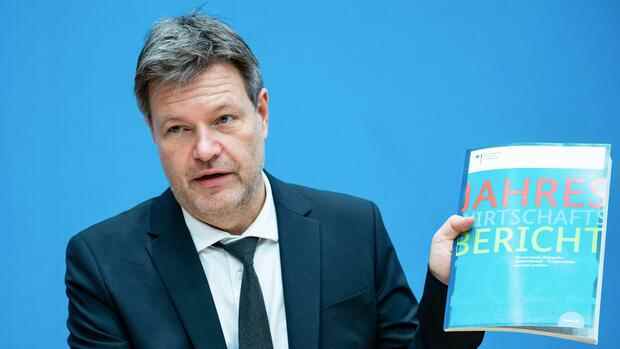The Federal Minister of Economics and Climate Protection at the presentation of the annual economic report.
(Photo: dpa)
Dusseldorf In the many decades that the annual economic report has existed, it has had a wide variety of focal points. In 1976, rising consumer prices and increasing unemployment were the main topics, after the financial crisis it was the upswing in 2011, and last year it was of course the impact of the corona pandemic on the economy. At his first presentation of the annual economic report, Federal Economics Minister Robert Habeck also chose a new focus. The report is entitled “For a social-ecological market economy – designing transformation innovatively”.
Above all, it is a chapter that causes a stir. This special chapter entitled “Sustainable and inclusive growth – making dimensions of welfare measurable” deals with how prosperity should be measured in the future.
Politicians and economists are currently focusing primarily on gross domestic product (GDP). But that doesn’t seem to fully go hand in hand with Habeck’s idea of prosperity. For example, he criticizes this approach by saying that environmentally harmful projects can certainly increase GDP.
That is why the economics minister wants to pursue a different strategy in the future and look at more than 30 other indicators to measure prosperity in addition to GDP. According to the report, these alternative factors include, for example, the development of emissions of air pollutants, the gender pay gap, an innovator rate and housing cost overburden.
We want to know from you: Is Habeck right? is the previous measure of prosperity outdated? How do you think wealth should be measured? Or has GDP simply proven itself too well internationally for another indicator to prevail? Write us your opinion in five sentences [email protected] We will publish selected articles with attribution on Thursday in print and online.
Top jobs of the day
Find the best jobs now and
be notified by email.
After all, Habeck does not want to completely ignore GDP. If we gave up the idea of growth, we would also give up the idea of progress, he argues. Rather, the other key figures are intended to lead to a more targeted interpretation of GDP.
>> Read here: So far, the economy has primarily been measured by growth. Economics Minister Habeck wants to change that radically and has 31 ideas for it
However, the idea of measuring prosperity in more than just GDP terms is not new either. In Bhutan, for example, gross national happiness is measured instead of gross national income. Measuring prosperity has also been an issue for the federal governments in recent years. Most recently, in 2015, the grand coalition made a move with the government strategy “Living well in Germany – what is important to us”. She wanted to find out from citizens what constitutes a “good life” in Germany. Based on this exchange, the then federal government selected 46 indicators to make the status and development of the quality of life in this country measurable.
So far, however, all the concepts of previous federal governments have ended in pages of reports without fundamentally changing anything. It remains to be seen whether Habeck will be more successful with his initiative.
If you would like to have your say on this topic in the Handelsblatt, write us a comment, either by e-mail [email protected] or on Instagram at @handelsblatt.
There is still no sign of a solution to the Russia-Ukraine conflict. Last week, Handelsblatt readers discussed how Germany and the EU should position themselves.
